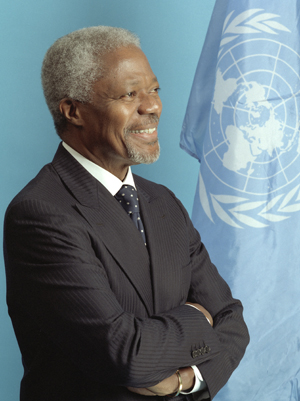Message on World TB Day
24 March 2005







Five thousand people die from tuberculosis every day, although the disease is both preventable and curable. Clearly, we must work harder if we are to achieve, by 2015, the Millennium Development Goal of halting and beginning to reverse the spread of TB as one of the world's major diseases. Thanks to a massive scale-up of the DOTS strategy for TB control recommended by the World Health Organization, with 17 million persons treated in nine years, our prospects for reaching the goal have improved greatly.
WHO reports that eight in 10 patients are successfully treated under DOTS programmes, and that 45 per cent of infectious patients were treated in 2003 -- up from 28 per cent in 2000. But huge obstacles remain, particularly in Africa -- in the form of weak health systems, a depleted health workforce, and an HIV/AIDS epidemic that is driving TB. As Nelson Mandela said, "We cannot win the battle against AIDS if we do not also fight TB. TB is too often a death sentence for people with AIDS." I urge African leaders to make the fight against both diseases a priority.
The Stop TB Partnership, with its 350 partner governments and organizations, is making a difference by forging consensus on strategies, coordinated responses, mechanisms for quality drug supply, and action for new diagnostics, drugs and vaccines. Governments, bilateral agencies, the Global Fund to Fight AIDS, TB and Malaria, and the World Bank are providing more resources. Still, to achieve worldwide impact, more is needed. And we must provide greater support for the increasingly wide range of caregivers who help find people ill with TB and assist them with treatment. These providers include not just public health doctors and nurses, but also community leaders, former patients, women's groups, and many others.
Such broad mobilization is our strongest weapon in the fight against the disease. On this world TB Day, let us rededicate ourselves to that mission.
Kofi A. Annan
